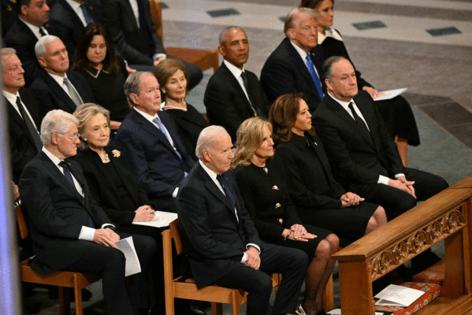Commentary: What happened to civility?
Published in Op Eds
It was the “belly tap heard around the world.”
When former President George W. Bush gave his successor Barack Obama the playful tap at Jimmy Carter’s state funeral in January, the interaction went viral.
Why should a simple act of civility among people of different political backgrounds be so noteworthy?
Unfortunately, we have become accustomed to seeing politicians – and fellow citizens – settle political differences through hostility and demeaning insults. This expectation of incivility has reached our young people as well.
A 2023 survey from the nonprofit Heterodox Academy found nearly 59% of college students were reluctant to discuss controversial topics in the classroom, where debate and disagreement should flourish as part of the educational process. Their leading concern was criticism and backlash from peers.
At the Bill of Rights Institute, we work with more than 80,000 civics and history teachers who reach more than 8 million students annually. As one Pennsylvania teacher told us, “What students often witness today is political division that has weaved its way through every topic imaginable, leaving little room for candid and sincere dialogue free of this divisiveness.”
So, what happened to civility – or at least the belief we could disagree amicably? And how do we build something better for our young people today?
The good news is that civility can make a comeback. But we need to be clear-eyed about three challenges young people face and implement practical solutions for improvement.
Adults modeling poor behavior
There are too many adults today demonstrating incivility, particularly online. Adults have been both the perpetrators and victims of online harassment.
One Pew Research Center survey found that 41% of adults experienced some form of online harassment, and half of this group cited politics as the reason they were targeted. Our young people, of course, see all of this. In fact, research shows many children will mimic adults’ behavior – both online and offline – even if they think it is wrong.
As adults, we need to do a better job of modeling civil discourse for our young people and helping them understand that disagreement does not make our neighbors into enemies.
Social media discourages nuance and diverse viewpoints
According to a 2023 Gallup survey, the average American teen spends 4.8 hours per day on social media. Unfortunately, social media is not particularly conducive to nuanced discussions of controversial issues – it is a place where quick hits and “hot takes” are rewarded.
Social media algorithms also may limit young people’s exposure to diverse viewpoints. These algorithms are designed to give users more of what they are interested in, as opposed to exposing them to all sides of an issue. This forms echo chambers where there is only one side and one source of truth.
A 2021 study in the American Economic Review found when people are exposed to diverse viewpoints online, they are less likely to develop negative attitudes toward people they disagree with. However, the same study found social media algorithms may limit exposure to diverse viewpoints.
A de-emphasis on civics in schools
If we want young people to learn to engage civilly, even with people they disagree with, let them practice those skills.
Civics classes help students develop citizenship skills, participate in structured civil discourse around current issues, and study principles that unite us as Americans despite our differences.
But some states still do not have a civic education requirement, or they wedge a small amount of civics into other courses. At the elementary level, research funded by the National Science Foundation found that students may receive as little as 16 minutes of social studies education daily.
We must re-emphasize civic education in our schools, and more community members are needed to advocate for civics at the local level.
We can and should bring more civility to our national discourse, and working with our young people is an appropriate place to start.
Civility is not about abandoning our principles or even changing our beliefs. It is about a shared commitment to engage respectfully, even when we disagree, and to work together to find common solutions.
Many Americans demonstrate this civility every day, and we need to ensure our young people develop these skills as well. What isn’t learned is lost.
____
David J. Bobb, Ph.D., is president and CEO of the Bill of Rights Institute, a nonpartisan, nonprofit organization that teaches civics and history.
____
©2025 The Fulcrum. Visit at thefulcrum.us. Distributed by Tribune Content Agency, LLC.




























































Comments